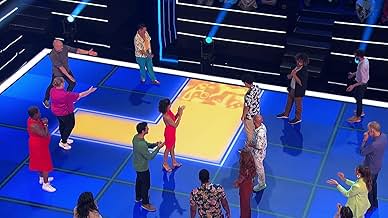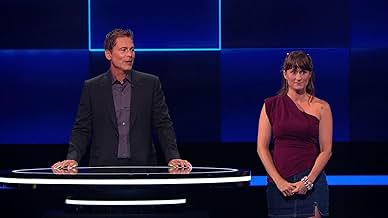The Floor
- Serie TV
- 2024–
- 43min
VALUTAZIONE IMDb
7,6/10
1184
LA TUA VALUTAZIONE
Aggiungi una trama nella tua lingua81 contestants stand on 81 squares on a massive game show floor, competing for a whopping grand prize.81 contestants stand on 81 squares on a massive game show floor, competing for a whopping grand prize.81 contestants stand on 81 squares on a massive game show floor, competing for a whopping grand prize.
Sfoglia gli episodi
Recensioni in evidenza
I get the lights and the fun every day people playing. Not sure why we need to know the inside scoop on every player, especially the ones that lose right away. How hard would it be to move this faster and have a couple more rounds of players actually playing the game? Is it really that hard to come up with questions for this 'game'?
The premise is solid, the execution is mush. Advertisements and deep dives into people we really have no want or need to know about completely ruin what could have been a fun time for all.
I had a conversation with my wife about this show before she had seen an episode and I asked her to watch episode one and tell me what her grade would be. Her first sentence was, "When they finally played the game, I was in the other room doing something else."
The premise is solid, the execution is mush. Advertisements and deep dives into people we really have no want or need to know about completely ruin what could have been a fun time for all.
I had a conversation with my wife about this show before she had seen an episode and I asked her to watch episode one and tell me what her grade would be. Her first sentence was, "When they finally played the game, I was in the other room doing something else."
As in every trivia game, it is always fun to test your own skills and knowledge at home with your family against the contestants.
The premise is interesting in an overall outlook. But when you actually see the show, you find that it is less about skill and more about luck, random chance, and uneven rules.
I summarize and suggest some changes which could really add to the show's potential:
1) Contestants who excel and win several games in a row should be «saved» for the final round. In this way, you make sure the final will be exciting and batlled among the very two, three or four best. To watch a poor contestant who is called for duty just in the last round and wins it all is very disappointing and anti-climactic.
2) A failed answer by a contestant should be transfered to the opponent, that is, a pass or fail would be 'inherited' by the other, just as you inherit categories. This makes chances more even every time a difficult item is shown in the screen.
3) The required level of specification is uneven and unfair across categories. In some matches, just the last name is enough, but in others, a detailed and full compound answer is needed for the answer to be validated. Arbitrary criteria should be rectified to make matches fairer.
4) Also the level of difficulty across categories is uneven. Some involve the easiest images of everyday items (a spoon, a notebook, traffic lights), and other categories have a different kind of prompt which makes them quite more difficult, such as showing Shakespeare's quotes to guess the name of the work. This might be interesting but it is not fair and suggests suspicion of rigged hands.
5) Finally, all the «scripted» short remarks by the contestants, shown between matches as fillers, sound fake, and they put viewers off instead of creating expectation or interest. Less is more, in this case.
Rob Lowe is okay. Not smashingly good or epoch-making, but fulfills the role well enough.
In short, the show is promising and basically good, but I expect more changes and adjustments in next seasons.
The premise is interesting in an overall outlook. But when you actually see the show, you find that it is less about skill and more about luck, random chance, and uneven rules.
I summarize and suggest some changes which could really add to the show's potential:
1) Contestants who excel and win several games in a row should be «saved» for the final round. In this way, you make sure the final will be exciting and batlled among the very two, three or four best. To watch a poor contestant who is called for duty just in the last round and wins it all is very disappointing and anti-climactic.
2) A failed answer by a contestant should be transfered to the opponent, that is, a pass or fail would be 'inherited' by the other, just as you inherit categories. This makes chances more even every time a difficult item is shown in the screen.
3) The required level of specification is uneven and unfair across categories. In some matches, just the last name is enough, but in others, a detailed and full compound answer is needed for the answer to be validated. Arbitrary criteria should be rectified to make matches fairer.
4) Also the level of difficulty across categories is uneven. Some involve the easiest images of everyday items (a spoon, a notebook, traffic lights), and other categories have a different kind of prompt which makes them quite more difficult, such as showing Shakespeare's quotes to guess the name of the work. This might be interesting but it is not fair and suggests suspicion of rigged hands.
5) Finally, all the «scripted» short remarks by the contestants, shown between matches as fillers, sound fake, and they put viewers off instead of creating expectation or interest. Less is more, in this case.
Rob Lowe is okay. Not smashingly good or epoch-making, but fulfills the role well enough.
In short, the show is promising and basically good, but I expect more changes and adjustments in next seasons.
The game play itself seems very interesting and different from most other game shows.
However, the format of the show was mind-numbingly long and drawn out. As typical for most shows nowadays, they inserted too much dialogue in between the question rounds along with unnecessary sound effects and graphics. I franky got bored. Thankfully I recorded it, so I could just fast forward through all the ridiculous drivel.
If they want people to stay tuned, they need to replace all the manufactured drama filler content with many more rounds of questions per hour, it would make it so much more enjoyable to watch.
However, the format of the show was mind-numbingly long and drawn out. As typical for most shows nowadays, they inserted too much dialogue in between the question rounds along with unnecessary sound effects and graphics. I franky got bored. Thankfully I recorded it, so I could just fast forward through all the ridiculous drivel.
If they want people to stay tuned, they need to replace all the manufactured drama filler content with many more rounds of questions per hour, it would make it so much more enjoyable to watch.
Over the years, we have seen the sets for TV game shows become more automated. The availability of smart walls, and now floors, has changed the genre. This game show uses a 9X9 grid to create 81 spaces on the floor, each occupied by a contestant. Players randomly selected, get to challenge adjoining players. The concept of 81 players battling for a grand prize of $250,000 is appealing. Each player has a category of expertise, and when you challenge someone, you must play in their category.
A challenge consists of a head-to-head matchup, but players play against the clock. Each gets 45 seconds of time, and they take turns trying to identify items that flash on a screen. If your clock runs down first, you lose and the conqueror gets your space on the floor.
Besides the big prize going to the person who wins the 80th match, $20,000 is awarded to the player who occupies the most space on the floor at the end of each episode.
There are various strategies at play. Do you challenge someone in their category of expertise or wait for someone to challenge you? If you challenge someone and win, you assume their category. Do you like that category? If you challenge someone, your clock begins counting down first. Do you want to lay low and use the time between episodes to bone up on your new category?
In the first two episodes, they played 7 or 8 matches and the choices became more complex as the game went on. As for the matchups, they are entertaining.
A challenge consists of a head-to-head matchup, but players play against the clock. Each gets 45 seconds of time, and they take turns trying to identify items that flash on a screen. If your clock runs down first, you lose and the conqueror gets your space on the floor.
Besides the big prize going to the person who wins the 80th match, $20,000 is awarded to the player who occupies the most space on the floor at the end of each episode.
There are various strategies at play. Do you challenge someone in their category of expertise or wait for someone to challenge you? If you challenge someone and win, you assume their category. Do you like that category? If you challenge someone, your clock begins counting down first. Do you want to lay low and use the time between episodes to bone up on your new category?
In the first two episodes, they played 7 or 8 matches and the choices became more complex as the game went on. As for the matchups, they are entertaining.
I love this show so much but I can't stand that they brought in a multiple time Jeopardy champion "David" (who's already won over $700K on Jeopardy) to compete against all the other normal folks in season 3! It's just not even enjoyable to me, if I wanted to watch a Jeopardy champ, I'd watch "Jeopardy" lol. Please "The Floor" producers, don't do that again lol. "David" at the start of the show was almost a millionaire from Jeopardy but now he wants another $250K (plus other bragging rights I'm sure) when to the other regular people competing that money could be truly life changing. Otherwise this show is very good, esp if you love trivia like I do! It's very unique and I highly recommend watching!
Lo sapevi?
- QuizThe American version of The Floor is based on the Dutch game show with the same name. As of Jan 2024, there are 10 versions across the globe including: Argentina, France, Germany, Hungary, Italy, Netherlands (the original), Romania, Spain, Ukraine and the US.
- BlooperIn Season 3, one of the categories is "European Geography" and one of the answers is "Turkey". Turkey is in Asia and is part of the Middle East. Its people are not Europeans, its natives are Brown, not Whites, they do not speak any European languages, it's a Islamist country and the inhabitants are Turks or Middle Easterners, similar to Iranians and Iraqis. Turkey borders other Arabic countries like Syria and Armenia. The category wasn't "European Union" which Turkey has tried to be accepted in but was repeatedly refused, as the Middle East is not part of Europe.
- ConnessioniSpoofed in Il Saturday Night Live: Shane Gillis/21 Savage (2024)
I più visti
Accedi per valutare e creare un elenco di titoli salvati per ottenere consigli personalizzati
Dettagli
Contribuisci a questa pagina
Suggerisci una modifica o aggiungi i contenuti mancanti





























